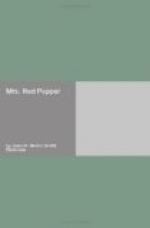“She would rather stay where she can help him than go away to a home of her own with any other man,” Ellen said to herself; and the little twinge of envy became almost a pang. She stood staring out of the window, her dark eyes heavy with her thoughts, her lips taking on a little twist of pain. Then, presently, she lifted her head. “She will never, never let him know. He will never discover it for himself. But if she can find happiness in being of use to him, and he can reward her by being her good friend, why should I mind? Can’t I be generous enough for that, when I know I have his heart? Her love for him won’t hurt him. She can’t take it back, but she will never let it show so that he can feel more of it than is good for him. It is so little for me to spare her—so much for her to have. I will be glad, I will be glad!”
She smiled at Bobby Burns, running up the walk, but, being a woman, she smiled through tears.
The little lad ran in. “Oh, Auntie Ellen,” he cried, “do you care ’cause I gave my new ball away? It was a new boy came to school, all patched. He’d never had a ball in his life. Uncle Red said I had to be good to other boys, ‘cause I’ve got so much more’n some of them. I sort o’ wanted to keep the ball, too,” he added, regretfully. “It was a dandy ball.”
“But it was nice to give it away, too, wasn’t it, Bob?”
He nodded, looking curiously up at her. “You’re cryin’, Auntie Ellen,” he said, anxiously. “Does sumpin’ hurt you?”
“Nothing that ought to hurt, dear. It’s too bad that being generous does hurt sometimes. But it ought not to hurt, when we have so much more than some of the others, ought it, Bob?”
CHAPTER XV
FLASHLIGHTS
“Please tilt your parasol back the least bit more, Miss Austin. That’s it! Now walk toward me, up this path, till you reach the rosebush.”
Miss Austin, a tall, thin young woman clad in white muslin and wearing also a prim expression with which her photographer had been struggling for some time in vain, obeyed these directions to the letter. Her lips in lines of order and discretion, her skirts hanging in perfect folds, she advanced up the straggling path, the picture of maidenly composure. The nearer she drew to the rosebush the more fixed became the look of meeting a serious obstacle and overcoming it by sheer force of will.
Charlotte Ruston, standing by her camera focussed on the spot of path beside the rosebush, drew a stifled, impatient breath. “I’m going to scream at her in a minute,” she thought, “or fall in a faint. I wonder which would startle her out of herself most.”
“Do you mind,” she said aloud, “if I tell you how perfectly charming you look?”
Miss Austin’s lips tightened into a little set smile, more artificial than ever. But just as she reached the rosebush a motor car rushed up the street and came to a standstill before the gate in Charlotte’s hedge. Out of the car—a conspicuous affair of a strong yellow colour, and hitherto unseen in the town—descended a figure in a dust-coat, a figure upon which Miss Edith Austin had never set eyes before. Pausing by the rosebush she looked toward the scene at the gate, and her face relaxed into an expression of alert interest.




